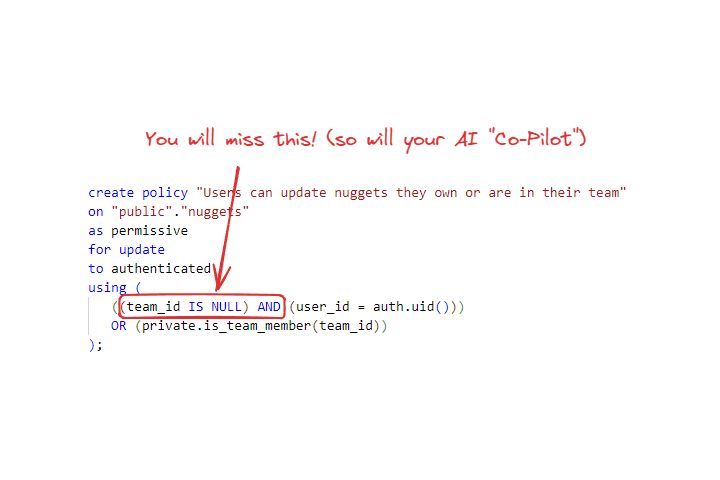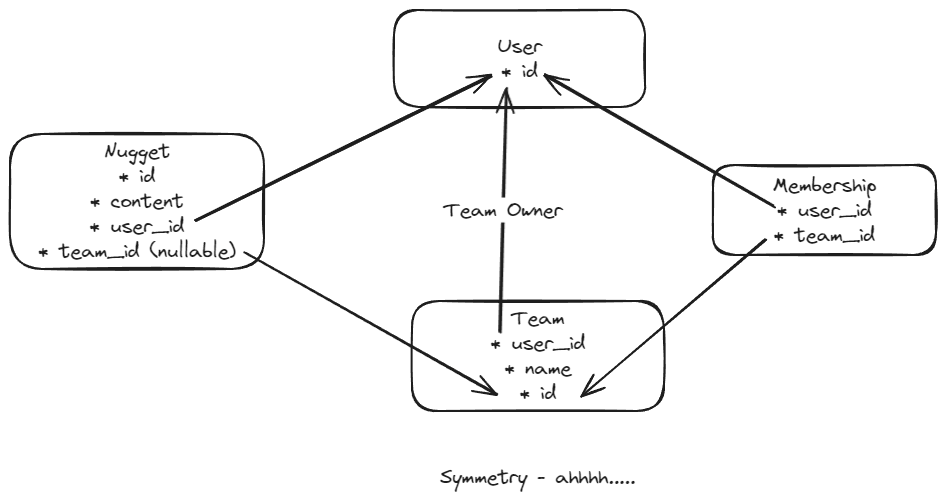
Supabase RLS Automated Testing
Fri Mar 15 2024
It is no doubt that AI offers a huge productivity boost to coders. That productivity boost, however, comes with some hidden risks. Therefore it is crucial to take advantage of the time savings to write extensive automated tests. I recently came across a perfect example of this while exploring Supabase to create an app. This app has a very simple data model:

In this app users create content called "nuggets". Users can also create teams to share their nuggets with others. If a nugget has a value in team_id then it is part of team and anyone in the team can view or edit that nugget.
Being new to RLS I got some help from Codeium to help write the RLS rules. They all looked very straightforward to me. Take the update rule for example
create policy "Users can update nuggets they own or are in their team"
on "public"."nuggets"
as permissive
for update
to authenticated
using (
(user_id = auth.uid())
OR (private.is_team_member(team_id))
);
At a first glance this all looks ok:
- If my user_id matches the id of the nugget then it is my nugget and I of course can edit it.
- If the nugget is in a team and I am a member of the team then I can also edit it.
Unfortunately this rule has a security bug! Can you spot it? I sure couldn't and am so thankful that I wrote automated tests to make sure my RLS rules were doing the right thing.
Playwright to the Rescue
I created a really simple rig to test my RLS rules. I began by following Playwright's getting started guide.
Then I added a command to my package.json to help me run the tests (and run them in only one browser):
"test:e2e": "playwright test --project=chromium"
Writing tests was easy and quite a bit of fun. Each test drives the Supabase Javascript client library in the playwright browser and look like this:
import { test, expect } from '@playwright/test'
import { createClient } from '@supabase/supabase-js'
// Create user and admin clients for interacting with your local dev database
const supabase = createClient('http://localhost:54321', 'TEMPORARY DEV ENV ANON TOKEN HERE - DO NOT USE PROD TOKEN')
const supabaseAdmin = createClient('http://localhost:54321', 'TEMPORARY DEV ENV ADMIN TOKEN HERE - DO NOT USE PROD TOKEN')
test.beforeEach(async ({ page }) => {
const { data: { users }, error } = await supabaseAdmin.auth.admin.listUsers()
// Note: we depend on db cascades to cleanup all test user's data!
// If the local test database get polluted, run : yarn supabase db reset
// Ensure supabase is logged out
await supabase.auth.signOut()
// Cleanup data from previous test runs by removing test users
for (const user of users) {
if (user.email?.includes('permissions-team-test.com')) {
console.warn('~~ removing test user', user.id)
await supabaseAdmin.auth.admin.deleteUser(user.id)
}
}
})
test.describe('Team RLS', () => {
test('a user can create and delete a team', async ({ page }) => {
// Create user for the test
const { data: registerData, error: registerError } = await supabase.auth.signUp({
email: 'test1@permissions-team-test.com',
password: 'foobart1',
})
expect(registerError).toBeNull()
expect(registerData.user).toBeDefined()
// Create team
const { data: teamId, error: createTeamError } = await supabase.rpc('create_team', { team_name: 'Test Team 1!' })
expect(createTeamError).toBeNull()
// Fetch team
const { data: teamData } = await supabase
.from('teams')
.select('*')
.eq('id', teamId)
expect((teamData as any)[0].name).toBe('Test Team 1!')
// Make sure user has membership for team
const { data: memberships, error: membershipsError } = await supabase
.from('memberships')
.select('*')
expect(membershipsError).toBeNull()
expect((memberships as any).length).toBe(1)
// Delete team
const { error: deleteTeamError } = await supabase
.from('teams')
.delete()
.eq('id', teamId)
expect(deleteTeamError).toBeNull()
// Make sure team is gone
const { data: teams, error: teamsError } = await supabase
.from('teams')
.select()
.eq('id', teamId)
expect(teamsError).toBeNull()
expect((teams as any).length).toBe(0)
})
// ... more tests here
})
These tests also serve as a great pool of example code to use while developing my app's frontend!
The Security Bug
When writing tests for the update rules for the nuggets table I remembered something I read in the Designing Secure Software book - hackers will sometimes try to inject content into other user's teams. In the case of my faulty RLS rule above, if I know the id of a team in the application I can add my nuggets to it simply by setting team_id. I don't even have to be a member of the team! Storing team_id on the nugget model probably isn't a good choice, but I can also fix this simply by adjusting the RLS rule:
create policy "Users can update nuggets they own or are in their team"
on "public"."nuggets"
as permissive
for update
to authenticated
using (
((team_id IS NULL) AND (user_id = auth.uid()))
OR (private.is_team_member(team_id))
);
Now users have to be a member of the team!
So, the moral of the story is write tests - in the era of AI they are more essential than ever!
